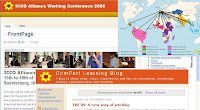 Nom de l’atelier
Nom de l’atelierFormation sur le Web 2.0. (Outils ComPart) des acteurs du Programme Multi Acteurs d’Alphabétisation au Mali ( PMA –Mali) - Ségou, 21-24 décembre 2009
Contexte et justification
Dans le soucis de maximaliser les échanges d'information, d'expériences, les partenaires d’ICCO (PMA Mali) Programme Multi Acteurs d'Alphabétisation au Mali avaient reçu une formation en wiki, en octobre 2008 au Burkina en même temps que leurs homologues de ce pays et du sénégal.
Cette formation a permis aux participants d'apprécier l'importance d'un tel outil dans un processus multi acteurs.

Cependant tout au long de la première année d'utilisation, des difficultés majeures n'ont pas permis à la plupart des acteurs d'exploiter cet outil précieux de travail, limitant ainsi les échanges et correspondances attendus.
Pour corriger cette insuffisance, il a été inscrit dans le sous programme national du PMA, un renforcement conséquent des capacités des acteurs en outils Web 2.0 et en Wiki, pour cette deuxième phase 2009 2010,en vue leur utilisation à hauteurs de Souhait.
But de la formation:
Aider les partenaires d’ICCO (PMA Mali) à comprendre les avantages de l’utilisation du Web 2.0 et ses outils. Objectifs du renforcement :
- Familiariser les partenaires du PMA Mali avec les outils du web 2.0 en tant que outils de développement du travail en réseau
- Renforcer la synergie entre les partenaires du PMA Mali à travers une intensification des importations et exportations de connaissances et expériences ;
- Développer le wiki et ses outils pour l’amélioration de l’interaction circulaire au sein du réseau
- Améliorer la qualité du travail à travers une communication interne et externe plus efficace et plus efficiente
- Développer les capacités techniques des acteurs du réseau en matière de communication
Les travaux de groupe riche en partage
Planification
- Présentation du Web 2.0 et ses outils collaboratifs
- Présentation des outils ComPart
- Présentation du Wiki ;
- Exercices pratique sur le Wiki
- Exercice pratique sur Picture Manager pour les photos
- Exercice Pratique sur Movie Maker pour les Video
- Formatage de textes en format de mise en ligne (bloc notes)
- Exercice Pratique sur Flickr et slideo ;
- Travaux de groupe sur les mises en lignes de contenus
- Présentation des travaux de groupe
- Editer, modifier et commenter les contenus
Ce qu'ils gagneront
Connaître le Web 2.0:
- Se familiariser avec les outils Web 2.0 ;(ComPart)
- Savoir traiter les textes, les photos et videos en format web
- Créer un espace dans le wiki pour les partenaires et l’alimenter
- Apprendre à faire des mises en lignes de contenus (Textes, Photos, Vidéos…)
- Apprendre à modifier, éditer et commenter des contenus…
- La visibilité sur l’ensemble des actions de projets pour les partenaires et bailleurs
Discussions au tour du repas de midi
Methodologie
La méthodologie de l’atelier reposera sur les principes: faire, faire avec et faire faire. Elle privilégiera des activités pédagogiques telles que les exposé, les exercices pratiques, les discussions en plénières, les travaux en sous-groupes, les témoignages des participants, etc..
Resultats attendus
- Les partenaires du PMA Mali sont capables d’expliquer les outils du web 2 (wiki, blog, dgroup) et de démontrer comment les utiliser
- Le Wiki du programme multi-acteur Mali est redynamisé et fonctionne correctement
- Les partenaires utilisent le wiki et ses outils pour les échanges d’informations et d’expériences
- La communication interne et externe est plus fluide
- L’interaction entre les partenaires est améliorée
Resultats obtenus
Se trouvent sur les liens suivants:
- https://educmali.pbworks.com/Bienvenues-sur-la-Formation-Wiki-PMA
- https://educmali.pbworks.com/Formation-wiki-Goupe-Oumar-Dembele
- https://educmali.pbworks.com/Formation-Wiki-Groupe-Ibrahim-Maiga
- https://educmali.pbworks.com/Travaux-du-groupe-3
Mme Sy Haoua Coulibaly Chargée de Communication
Réseau Plaidoyer et Lobbying (RPL)
M Boukader Sandy Chef de mission P.M.A
(Programme Multi Acteurs) Tombouctou
Les mots d'evaluation
A travers les methodes d'evaluation adoptées tous les jours par les participants eux mêmes, il ressort ce qui suit:
- Developper un outils de communication instantané chat (ecrit, vocal... ex genre Skype) au tour du wiki afin de favoriser l'apprentissage mutuel et rester connecter de façon permanente et voir les membres du reseaux en ligne pour faciliter d'avantage la vulgarisation de l'information qui est incontournable pour le développement; en tant que facilitateur j'ai pensé à AT&T connect qui peut valablement repondre à cette demande et répondre efficacement aux nombreuses attentes.
- Organiser des formations de recyclage pour permettre de toucher des points et aspect innovants en la matière pour faciliter l'atteinte des objectifs.
- Rester en réseaux via le wiki pour plus de visibilités, d'entraide et de partages.
Ségou le 25 décembre 2009
Oudou Bengaly



.JPG)





















